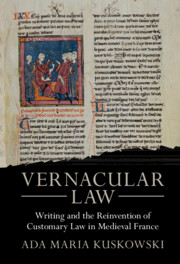Book contents
- Vernacular Law
- Studies In Legal History
- Vernacular Law
- Copyright page
- Dedication
- Contents
- Figures
- Acknowledgments
- A Note on the Text
- Introduction Vernacular Writing and the Transformation of Customary Law in Medieval France
- Part I Written Custom and the Formation of Vernacular Law
- Part II Political and Intellectual Tensions
- 4 Uneasy Jurisdictions: Lay and Ecclesiastical Law
- 5 Roman Law, Authority, and Creative Citation
- Part III Implications
- Conclusion Lasting Model and Professional Community
- Bibliography
- Index
5 - Roman Law, Authority, and Creative Citation
from Part II - Political and Intellectual Tensions
Published online by Cambridge University Press: 27 October 2022
- Vernacular Law
- Studies In Legal History
- Vernacular Law
- Copyright page
- Dedication
- Contents
- Figures
- Acknowledgments
- A Note on the Text
- Introduction Vernacular Writing and the Transformation of Customary Law in Medieval France
- Part I Written Custom and the Formation of Vernacular Law
- Part II Political and Intellectual Tensions
- 4 Uneasy Jurisdictions: Lay and Ecclesiastical Law
- 5 Roman Law, Authority, and Creative Citation
- Part III Implications
- Conclusion Lasting Model and Professional Community
- Bibliography
- Index
Summary
The main question scholars have asked about the coutumiers is the extent of ‘penetration‘ or ‘influence‘ of Roman law on customary law. That there was influence is an undeniable fact. While the history of the coutumiers is undoubtedly connected to and overlaps with Roman law, this chapter challenges current historiography, which places Roman law at the centre of the development of written custom. Instead of asking how well an author knew his Roman law or how much of it was used in each text, this chapter looks more widely at citation practices, to establish what authorities were used and with what reverence they were treated. The citation practices in the coutumiers betray their authors’ confidence vis-à-vis the more august Roman law. These authors used learned law in service of their own projects but did not feel bound by its authority – unlike university thinking that famously placed Roman law in the middle of the page and medieval commentary in the marginalia. Roman law was certainly an important source for some coutumiers, but rather than treat it reverentially as an authority their authors used Roman law to build something new, lay, customary, and vernacular.
Keywords
- Type
- Chapter
- Information
- Vernacular LawWriting and the Reinvention of Customary Law in Medieval France, pp. 189 - 230Publisher: Cambridge University PressPrint publication year: 2022



